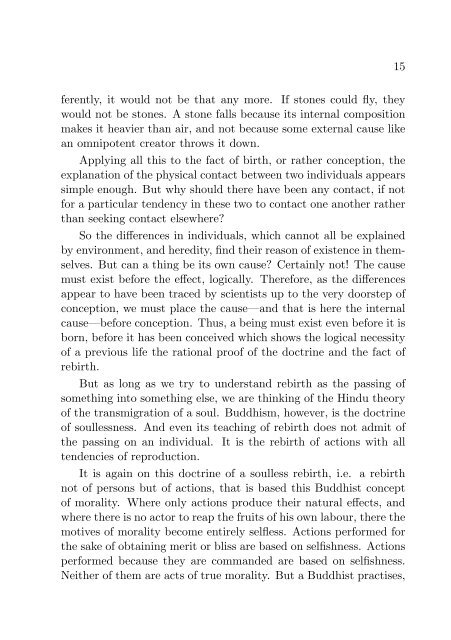Towards the Truth
Notes from a three-day debate in the 1940’s about Buddhism and Christianity.
Notes from a three-day debate in the 1940’s about Buddhism and Christianity.
You also want an ePaper? Increase the reach of your titles
YUMPU automatically turns print PDFs into web optimized ePapers that Google loves.
15<br />
ferently, it would not be that any more. If stones could fly, <strong>the</strong>y<br />
would not be stones. A stone falls because its internal composition<br />
makes it heavier than air, and not because some external cause like<br />
an omnipotent creator throws it down.<br />
Applying all this to <strong>the</strong> fact of birth, or ra<strong>the</strong>r conception, <strong>the</strong><br />
explanation of <strong>the</strong> physical contact between two individuals appears<br />
simple enough. But why should <strong>the</strong>re have been any contact, if not<br />
for a particular tendency in <strong>the</strong>se two to contact one ano<strong>the</strong>r ra<strong>the</strong>r<br />
than seeking contact elsewhere?<br />
So <strong>the</strong> differences in individuals, which cannot all be explained<br />
by environment, and heredity, find <strong>the</strong>ir reason of existence in <strong>the</strong>mselves.<br />
But can a thing be its own cause? Certainly not! The cause<br />
must exist before <strong>the</strong> effect, logically. Therefore, as <strong>the</strong> differences<br />
appear to have been traced by scientists up to <strong>the</strong> very doorstep of<br />
conception, we must place <strong>the</strong> cause—and that is here <strong>the</strong> internal<br />
cause—before conception. Thus, a being must exist even before it is<br />
born, before it has been conceived which shows <strong>the</strong> logical necessity<br />
of a previous life <strong>the</strong> rational proof of <strong>the</strong> doctrine and <strong>the</strong> fact of<br />
rebirth.<br />
But as long as we try to understand rebirth as <strong>the</strong> passing of<br />
something into something else, we are thinking of <strong>the</strong> Hindu <strong>the</strong>ory<br />
of <strong>the</strong> transmigration of a soul. Buddhism, however, is <strong>the</strong> doctrine<br />
of soullessness. And even its teaching of rebirth does not admit of<br />
<strong>the</strong> passing on an individual. It is <strong>the</strong> rebirth of actions with all<br />
tendencies of reproduction.<br />
It is again on this doctrine of a soulless rebirth, i.e. a rebirth<br />
not of persons but of actions, that is based this Buddhist concept<br />
of morality. Where only actions produce <strong>the</strong>ir natural effects, and<br />
where <strong>the</strong>re is no actor to reap <strong>the</strong> fruits of his own labour, <strong>the</strong>re <strong>the</strong><br />
motives of morality become entirely selfless. Actions performed for<br />
<strong>the</strong> sake of obtaining merit or bliss are based on selfishness. Actions<br />
performed because <strong>the</strong>y are commanded are based on selfishness.<br />
Nei<strong>the</strong>r of <strong>the</strong>m are acts of true morality. But a Buddhist practises,
















